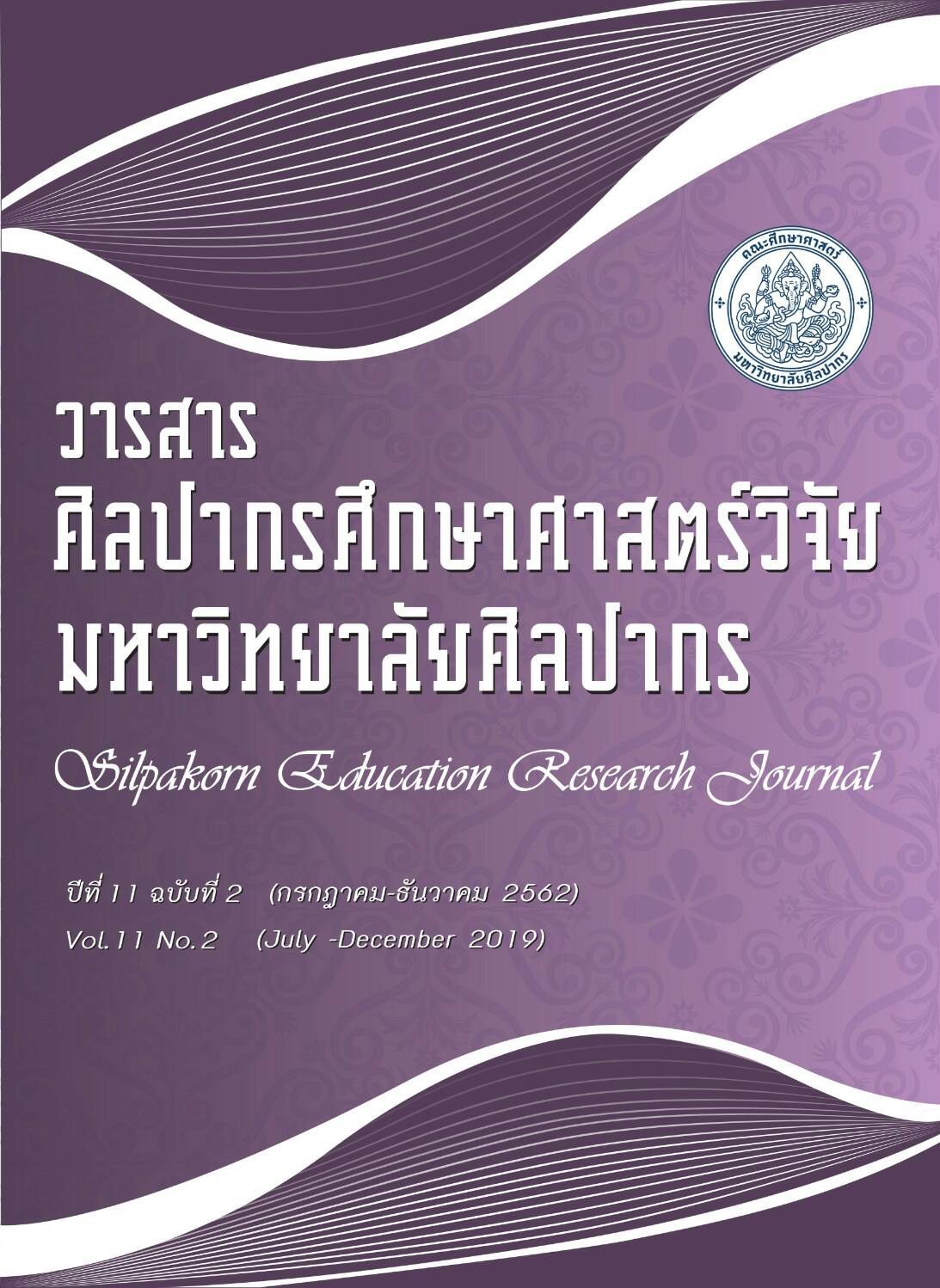ผลการจัดการเรียนรู้โดยใช้ปัญหาเป็นฐาน กลุ่มสาระการเรียนรู้วิทยาศาสตร์ ของนักเรียนชั้นมัธยมศึกษาปีที่ 2 (Effects of Using Problem-Based Learning Management on Science Subject Area of Matthayomsuksa 2 Students)
คำสำคัญ:
การจัดการเรียนรู้โดยใช้ปัญหาเป็นฐาน/ วิทยาศาสตร์บทคัดย่อ
บทคัดย่อ
การวิจัยครั้งนี้มีวัตถุประสงค์เพื่อศึกษา ผลการจัดการเรียนรู้โดยใช้ปัญหาเป็นฐาน ของนักเรียนชั้นมัธยมศึกษาปีที่ 2 โดยศึกษาผลสัมฤทธิ์ทางการเรียนวิทยาศาสตร์ ความสามารถในการแก้ปัญหา และความสามารถในการคิดอย่างมีวิจารณญาณ เครื่องมือที่ใช้ในการวิจัยประกอบด้วย 1) แผนการจัดการเรียนรู้โดยใช้ปัญหาเป็นฐาน 2) แบบวัดผลสัมฤทธิ์ทางการเรียน 3) แบบวัดความสามารถในการแก้ปัญหา 4) แบบวัดความสามารถในการคิดอย่างมีวิจารณญาณ
ผลการวิจัย พบว่า 1) ผลสัมฤทธิ์ทางการเรียนของนักเรียนชั้นมัธยมศึกษาปีที่ 2 ที่ได้รับการจัดการเรียนรู้โดยใช้ปัญหาเป็นฐานของนักเรียนหลังเรียนสูงกว่าก่อนเรียน และหลังเรียนสูงกว่าเกณฑ์ที่กำหนดร้อยละ 70 อย่างมีนัยสำคัญทางสถิติที่ระดับ .05 และมีผลสัมฤทธิ์ทางการเรียนด้านเข้าใจสูงที่สุด 2) ความสามารถในการแก้ปัญหาของนักเรียนหลังเรียนสูงกว่าก่อนเรียน และหลังเรียนสูงกว่าเกณฑ์ที่กำหนดร้อยละ 70 อย่างมีนัยสำคัญทางสถิติที่ระดับ .05 และมีความสามารถในการแก้ปัญหาขั้นวิเคราะห์ปัญหาสูงที่สุด และ 3) ความสามารถในการคิดอย่างมีวิจารณญาณของนักเรียนหลังเรียนสูงกว่าก่อนเรียน และหลังเรียนสูงกว่าเกณฑ์ที่กำหนดร้อยละ 70 อย่างมีนัยสำคัญทางสถิติที่ระดับ .05 และมีความสามารถในการคิดอย่างมีวิจารณญาณด้านความสามารถในการอ้างอิงหรือสรุปความสูงที่สุด
เอกสารอ้างอิง
Anderson, L. W., and Krathwohl, D. R. (2001). A Taxonomy for Learning, Leaching,
and Assessing: A Revision of Bloom’s Taxonomy of Educational objectives. New York: Addison Wesley Longman.
Chaipreecha, U. (2011). Effects of Problem-Based Learning in Science on
Critical Thinking and Problem Solving Abilities of Mathayomsuksa 2 Students. Master of Education Thesis Program
in Science Education, Graduate School, Chiang Mai University. (in Thai)
Chamnan, S. (2015). A Study of the Academic Achievement and Problem-Solving
Ability in Physics on the Newton’s Laws of Motion Using Problem-Based
Learning for Mattayomsuksa 4 Students. Master of Education Thesis Program in Science Education,
Graduate School, Suratthani Rajabhat University. (in Thai)
Dankaew, M. (2014). A Study of Problem Solving Ability and Learning
Achievement for Mathayomsuksa 2 Students Unit on “Human Body and Animal System”Using Problem-Based Learning.
Master of Education thesis Program in Curriculum and instruction, Graduate School, Khon Kaen University. (in Thai)
Darasamutr Sriracha School. (2016). Annual Report 2016, Darasamutr Sriracha
School. Chon Buri: Darasamut Sriracha School. (in Thai)
Duanupara. O. (2012). Problem-Based Learning Approach to the Critical Thinking for
Grade 8 Students. Master of Education Thesis Program in Science Education, Graduate School, Kasetsart University. (in Thai)
Hakhaphamongkholchai, W. and Sirisamphan, O. (2018). The Development of Critical
Thinking Skills Using Research-Based Learning of Matthayomsuksa 5 Students. Silpakorn Educational Research Journal 10(2): 241-254. (in Thai)
Honghem, S. and Uamcharoen, S. (2014). The Development of Science-problem Solving
Ability and Avidity for Learning Characteristic of Tenth Grade Students Taught by Inquiry Approach. Silpakorn Educational Research Journal 6(1): 91-103. (in Thai)
Khammanee, T. (2015). Thinking science (Type 19). Bangkok: Chulalongkorn University. (in Thai)
Ministry of Education. (2008). Indicators and Core Learning Content, Group Learning Science, According to the Core Curriculum Basic Education. B.E. 2551.
Bangkok: Agricultural Cooperatives of Thailand. (in Thai)
National Institute of Educational Testing Service (NIETS). (2016). Summary of Basic National Educational Tests. [Online]. Retrieved April 11,2016,
from https://www.newonetresult.niets.or.th/AnnouncementWeb/PDF/SummaryONETM6 _2559.pdf
Office of the Education Council. (2007). Guiedlines for Learner-Centered is Learning
Managemant: Problem-Based Learning. Bangkok: Agricultural Assembly of
Thailand. (in Thai)
Office of the Education Council. (2017). National Education Plan B.E. 2560 – 2579.
Bangkok: Graphic Sweet Pepper. (in Thai)
Office of the National Economics and Social Development Council. (2017). Economic
Development Plan and National Society. B.E. 2560-2564. Retrieved
December 4,2016, from https://www.nesdb.go.th/ewt_dl_link.php?nid=6422
Panich. V. (2012). The Way to Create Learning for Students in the 21st Century.
Bangkok: Tathata Publication. (in Thai)
Phochen, W. and Vanichwatanavorachai, S. (2014). The Development of Mathematics Problem Solving Ability of Ninth Grade Students Taught
by Problem Based Learning Approach. Silpakorn Educational Research Journal 6(1): 141-153. (in Thai)
Pimkheeree, N. (2012). A Study of Grade 10 Students Problem Solving Ability About on Substances in Radioactivity and Nuclear Energy
by Using Problem Based Learning. Master of Education Thesis Program in Science Education, Graduate School, Khon Kaen University. (in Thai)
Sattayasai. W. (2004). Problem-Based Learning. Bangkok: Booknet. (in Thai)
Sungrugsa. N. (2014). The Quality of Education on 21st Century Learning Skill : Revisited
to Mission ?. Journal of Education, Silpakorn University 11(1,2): 42-56. (in Thai)
Thanwiset, N. (2017). A Study of Learning Achievement on Work and Energy
Learning Unit and Problem Solving Ability of Matthayomsuksa 4 Students
Using Problem Based Learning (PBL). Master of Education thesis Program in
Curriculum and instruction, Graduate School, Nakhon Ratchasima Rajabhat
University. (in Thai)
Watson, G. and Glaser, E.M. (1964). Watson-Glaser Critical Thinking Appraisal Manual.
New York: Brace and World Inc.
Weir, J. J. (1974). Problem Solving is Everybody’s Problem. The Science Teacher,
41(4), 16-18.





